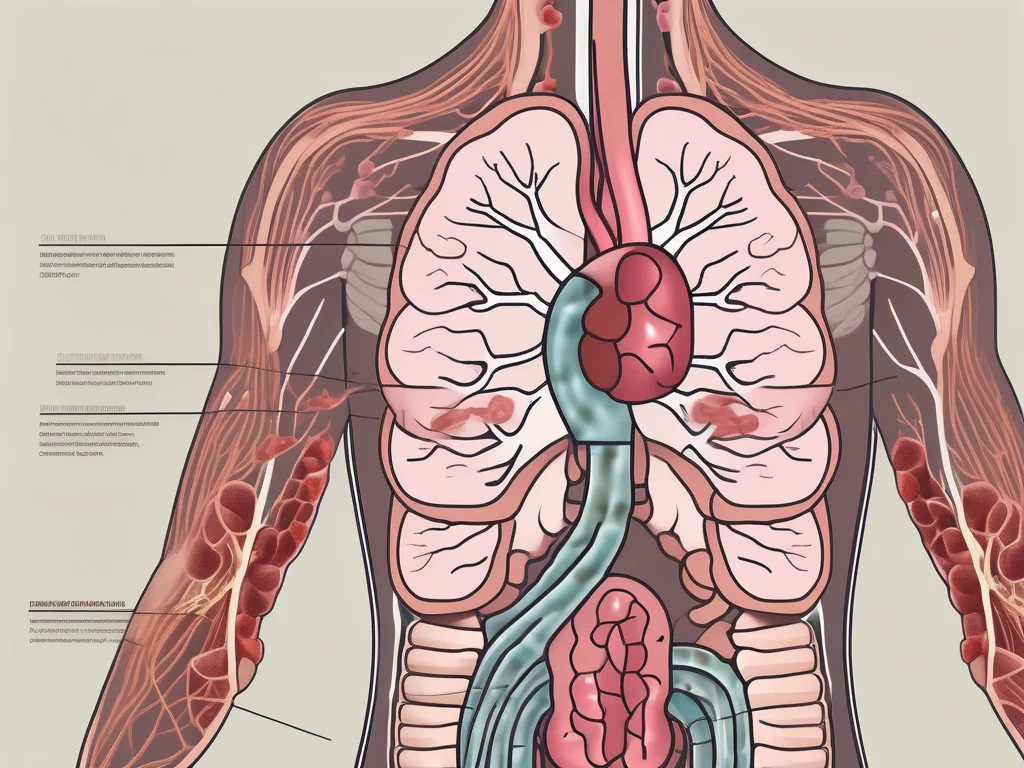What Is Duodenal Cancer?
Duodenal cancer, or duodenal adenocarcinoma, is a rare but aggressive malignancy originating in the duodenum, the first section of the small intestine. The duodenum aids digestion by mixing food with pancreatic enzymes and liver bile. When this cancer spreads, it often metastasizes to the liver, complicating treatment and prognosis. Understanding its progression is vital for effective management.
What Causes Duodenal Cancer?
The exact cause of duodenal cancer remains unclear, but several risk factors increase susceptibility:
- Age: Most common in individuals over 60 due to cumulative genetic and environmental factors.
- Smoking: Carcinogens in tobacco smoke can damage duodenal cells, raising cancer risk.
- Chronic Inflammation: Conditions like duodenal ulcers or chronic gastritis may contribute.
- Genetic Conditions: Disorders like familial adenomatous polyposis (FAP) or hereditary nonpolyposis colorectal cancer (HNPCC) increase risk through inherited mutations.
Regular screenings are crucial for at-risk individuals to detect early signs of cancer.
What Are the Symptoms of Duodenal Cancer?
Duodenal cancer symptoms are often vague, delaying diagnosis:
- Abdominal pain
- Nausea and vomiting
- Unintended weight loss
- Changes in bowel movements
These symptoms may mimic other gastrointestinal issues, complicating early detection. Diagnostic tools include:
- Imaging Tests: CT scans or MRIs to identify abnormalities.
- Endoscopy: Upper endoscopy or endoscopic ultrasound for direct visualization and biopsy.
- Biopsy Analysis: Confirms cancer presence and determines its stage and aggressiveness.
How Does Duodenal Cancer Spread to the Liver?
Metastasis occurs when cancer cells spread from the duodenum to other body parts, commonly the liver, via:
- Lymphatic System: Cancer cells travel through lymphatic vessels to lymph nodes or distant organs.
- Bloodstream (Hematogenous Spread): Cancer cells enter blood vessels, reaching the liver, which is highly vascularized and susceptible.
Liver metastasis, or secondary liver cancer, disrupts liver function and poses significant treatment challenges due to the organ’s critical metabolic role.
What Are the Treatment Options for Duodenal Cancer with Liver Metastasis?
Treating duodenal cancer that has spread to the liver requires a tailored, multidisciplinary approach. Options include:
Surgical Interventions
- Liver Resection: Removes cancerous liver tissue while preserving healthy areas, suitable for limited metastasis.
- Liver Transplant: Considered in select advanced cases, though not all patients qualify due to metastasis size or location.
Chemotherapy and Radiation
- Chemotherapy: Administered orally or intravenously in cycles to target cancer cells body-wide.
- Radiation Therapy: Uses high-energy beams to shrink localized liver metastases and alleviate symptoms.
Targeted Therapy and Immunotherapy
- Targeted Therapy: Drugs focus on specific molecular abnormalities in cancer cells, inhibiting growth.
- Immunotherapy: Boosts the immune system to attack cancer cells using checkpoint inhibitors or other agents.
Treatment choice depends on cancer stage, metastasis extent, and patient health.
What Is the Prognosis for Duodenal Cancer Spread to the Liver?
Prognosis varies based on:
- Cancer Stage: Early-stage cancers have better outcomes.
- Metastasis Extent: Size and number of liver metastases impact survival.
- Patient Health: Strong immune function and overall health improve prognosis.
Advancements in treatments have improved survival rates, though outcomes depend on individual factors. Consult healthcare providers for personalized prognosis details.
How Can Patients Manage Living with Duodenal Cancer and Liver Metastasis?
Living with metastatic duodenal cancer presents physical and emotional challenges. Strategies include:
Symptom Management
- Medications: Address pain, digestive issues, and fatigue.
- Lifestyle Changes: Dietary adjustments and complementary therapies like acupuncture can help.
Emotional and Psychological Support
- Support Networks: Engage with loved ones, support groups, or counselors.
- Therapy: Professional mental health support aids coping with diagnosis-related stress.
Palliative Care and End-of-Life Planning
- Palliative Care: Enhances quality of life by addressing physical, emotional, and spiritual needs.
- End-of-Life Planning: Discussing hospice care and advance directives reduces stress for patients and families.
Why Is Early Detection Important for Duodenal Cancer?
Early detection through regular screenings, especially for high-risk individuals (e.g., those with FAP or chronic inflammation), can identify precancerous changes or early-stage cancer, improving treatment success and survival rates.
What Advances Are Being Made in Duodenal Cancer Treatment?
Ongoing research into molecular mechanisms of duodenal cancer and liver metastasis is driving new treatment options. Targeted therapies and immunotherapies show promise in improving outcomes by attacking cancer cells more precisely while sparing healthy tissue.
Conclusion
Duodenal cancer spreading to the liver is a complex and challenging condition. Understanding its causes, symptoms, and treatment options empowers patients and caregivers to make informed decisions. Advances in surgical techniques, chemotherapy, radiation, and emerging therapies like immunotherapy offer hope for better outcomes. Early detection, symptom management, and emotional support are critical for improving quality of life. Consult with healthcare professionals for personalized care plans to address this serious disease.
Read this: Can I Use Itraconazole During Pregnancy? Risks, Safety, and Guidelines



